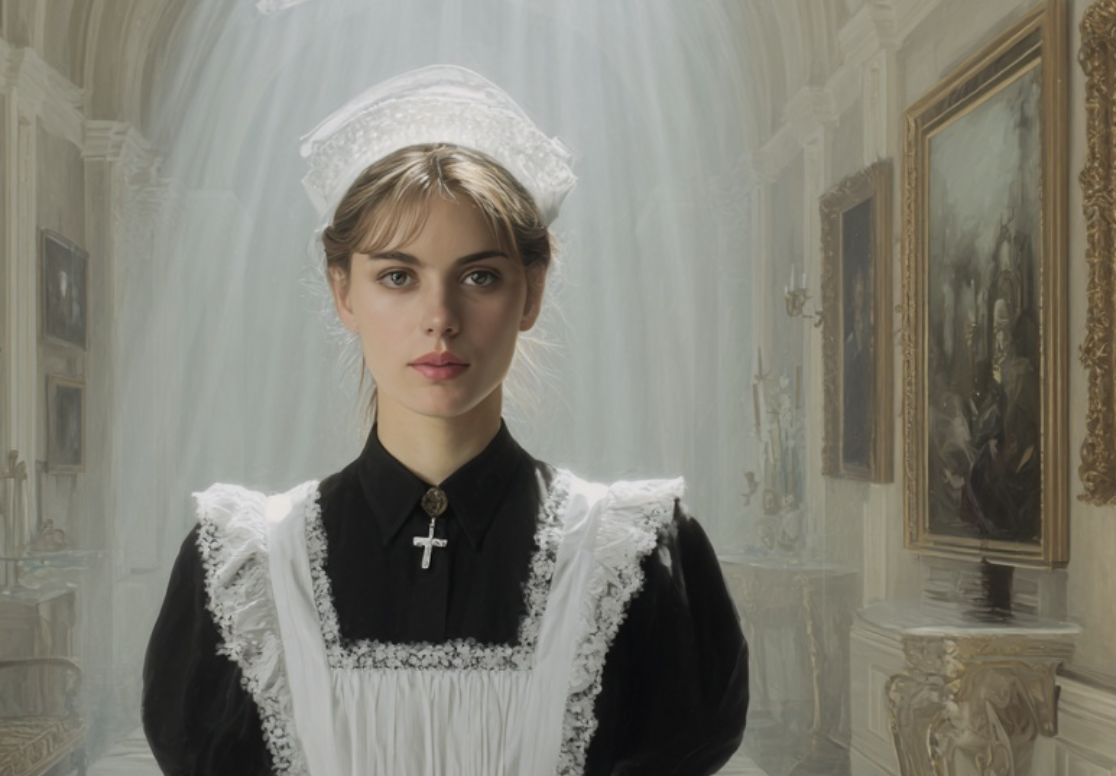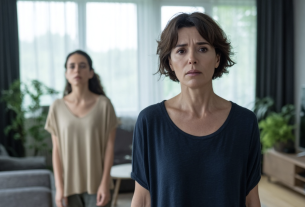While cleaning the house of a wealthy lady, a cleaner accidentally came upon an old locket and a photograph—items that had belonged to her long-deceased grandmother.
“Of course, I should have known better than to let the likes of you into my house! Next you’ll be hauling off the walls!” sneered Snezhana Olegovna, her lips twisting into a mocking smile. “Gather your rags and mops and don’t you ever show your face here again!”
“No, you’ve misunderstood, I’m so sorry…” Maria faltered. “I was just dusting, and suddenly—”
“—and the locket jumped into your hands all by itself?” the mistress cut her off, jabbing a thin finger—heavy with expensive rings—toward the door. “Out!”
Just in case, Maria lowered her head, hastily stuffed the rags into the bucket and, grabbing her humble supplies, hurried out through the gates of the elite property. Behind her came the sharp order: “Don’t let that thief in here again!”
Out on the street, amid the falling snow, Maria stood numb. The shuttle bus that picked up the cleaners wouldn’t arrive for nearly an hour. But she wasn’t thinking about the cold, or the long wait, or even the rudeness of that young woman half her age.
What kept circling in her mind was this: in that palatial house, in a cabinet made of costly wood, there lay the photograph and the locket of her own grandmother—things she had believed lost forever.
The last eighteen months had been hard on Maria and her husband. Like many parents desperate to help their children, they’d been caught in the trap of their own self-sacrifice—the conviction that they could give up anything for their son’s future.
Their twenty-year-old son, Seryozha, had once come home for the weekend and asked them to take out a loan for a powerful computer. “I need it for my studies,” he said, “to build complex 3D models. The old laptop can’t handle it; it freezes at every step.” He added that a tablet wouldn’t hurt either. “You don’t understand tech,” he argued, “but if I have this gear, my projects will be the best! They’ll even send me to a conference!”
Maria and her husband—a grocery cashier and a mechanic—had long dreamed of a bright future for their son. They’d poured all their savings into sending him to a prestigious university. “We’ve worked our whole lives; let him at least achieve something.”
“And I’ll be able to earn on the side,” Seryozha continued, “taking modeling commissions. I’ll pay the loan myself—just help me get it. They won’t lend to me—I’m a student, who needs me?”
Four months later, the truth surfaced. The boy had decided to become a “businessman.” Swayed by online courses, he’d sunk all the money into Chinese merchandise that no one bought. His marketplace venture flopped, and he nearly ended up owing the platform.
His father was adamant: “If you want to study—pay for it yourself.” After the monthly loan payments, there was nothing left for tuition.
Maria cried, but forgave him. One day she called her son:
“Seryozha, don’t quit the institute. I’ve got an idea. I’ll go clean private homes—I’ll manage somehow. Just don’t tell your father.”
So she started working as a cleaner after her main shift. Until six—on the register at “Shestyoročka,” then stairwell cleaning until late evening. She told her husband she was saving up to pay the loan off early.
One day Maria helped an elderly woman carry a heavy suitcase up to her flat. In gratitude, the woman made her tea. During their talk, she asked:
“Sorry to be blunt, but how did you end up cleaning stairwells?”
“I need the money,” Maria answered shortly, not wanting to reveal family troubles.
“Listen, Masha, go work for my cousin! She owns a cleaning company. You’ll be cleaning the homes of rich folks, not stairwells. The pay’s much better. Here’s her card, I’ll give her a heads-up!”
At first Maria was fired up by the idea. She flew home with hope. But doubts crept in: should she leave a stable job she’d had for nine years? Yes, the pay was low, but it was steady. And a new job—who knew?
Fate decided for her. A couple of weeks later, all the store employees were gathered and told: “Shestyoročka” is being converted into “Semyoročka.” Everyone was to go on unpaid leave during the overhaul. Whether there’d be work afterward—unknown.
Maria walked home dispirited: “I’m past fifty… What if they don’t take me?”
The next morning she took out the business card and dialed the number:
“Hello, Veronika Igorevna, this is Maria. Your cousin Nadezhda suggested I contact you about a job.”
“Maria! Hello! I’ve been expecting your call!”
That’s how Maria became a “cleaner”—in a neat uniform with a white apron, tidying mansions instead of stairwells.
At first she thought it was temporary—until “Semyoročka” reopened. But over time she realized: she liked the work. And the pay really was better. Most importantly—there was enough to help her son.
The first time they brought her to a wealthy home, Maria was nervous. People there had money—who knew how they’d treat her? But most were polite and hardly noticed her, as if she were invisible.
Only Snezhana Olegovna—the young wife of a well-off man—took a dislike to her instantly. She watched every task and grumbled:
“Do you have any idea how much that vase costs? Not that you could understand… Only ‘eco-friendly’ products, and be careful!”
Her coworkers reassured her: it wasn’t about Maria. The rich lady was bored and amused herself by belittling the help. Later, though, she might leave a generous tip. The cleaners joked that these were “hazardous working conditions”—and, as everyone knows, those pay more.
And here she was again at that mansion. A whole day’s work. But Maria had never feared hard work.
Bedroom, bathroom, living room, another bedroom… And again—that very grand cabinet with its endless shelves and doors. Each one needed to be opened, the contents carefully removed, wiped, and put back exactly as they were. Maria had long since mastered the cardinal rule of cleaning in private homes: leave flawless cleanliness, but as if you’d never been there.
“What an awkward album!” Maria had time to think as the heavy photo album slid off the shelf and thumped onto the floor. Old black-and-white snapshots spilled out. She immediately dropped to gather them up, hoping no one had noticed: what if these photos were especially precious to the family?
But her eye snagged on one of them. In the picture—smiling people in front of a log village house. Simple, familiar faces. “How life changes over the years,” flashed through her mind.
And suddenly her heart stopped. Among the photographs—her grandmother. Young, with the same kind smile Maria remembered from the family album. The very same photograph they had at home.
“What on earth?.. How is this here?” she whispered, stunned.
A thin bark made her tense—the approach of Snezhana Olegovna, a fluffy Spitz in her arms. Maria hurried the photos back inside, snapped the album shut… but at that moment a silver chain slipped out of it. On the tarnished locket the name was clearly engraved: “Pelageya.”
Her grandmother.
She had only just slipped the chain into her pocket when the mistress was beside her. After that—everything was a blur: accusations, shouting, humiliation, being thrown out. Pleased with herself, Snezhana even paused at the mirror to assess how effectively her words had sounded: “Did I look stern enough?”
While she admired her reflection, the Spitz, without ceremony, left its “mark” right on the bed.
Barely reaching the bus stop, Maria pulled out her phone and dialed her mother:
“Hi, Mom! How are you?”
“I’m fine, dear. And you?”
“Listen… do you remember if Grandma ever gave her photograph and locket to anyone?”
“You… saw the locket?” her mother’s voice trembled. “Have you found Ivan?.. Though he’s probably no longer alive… Where did you see this?”
“In a client’s cabinet. An exact copy of our photograph. I couldn’t have been mistaken.”
“Come. At once. I have something to tell you.”
Waiting for the bus was unbearable. On the way, Seryozha called asking for money. For the first time in a long while Maria snapped, “Not now! Leave me alone!”—and hung up.
She didn’t even go home—she headed straight for the bus station. Half an hour later a bus was carrying her to the village. In the kitchen, under the dim lamp, her mother began:
“It was during the war. A fire broke out in our village. The parents of a little boy, Ivan, died. He was hiding in a shed, screaming… Your grandmother, nearly dying herself, dragged him out of the flames. She was burned—remember the scars on her arms?”
Maria nodded. Fragments of childhood talks resurfaced—Grandma saying, “Fire is a terrible thing, but a person is worse if he won’t help.”
“My mother, then still very young, took the boy in. But soon she was called to the front—to work as a nurse. Ivan was placed with other villagers, and then he was sent to be evacuated. Everyone lost touch. Before parting, Grandma gave him her photograph and a locket engraved with her name, and he gave her his little cross with an icon.”
“Wait… that means…”
“What’s the name of the master of that house?”
“Fedor Ivanovich. Around sixty, I think.”
“Ivanovich… Then he’s Ivan’s son.”
Her mother slowly stood, went to the old sideboard, took out a box, and carefully drew from it a darkened chain with a cross.
“Take it,” she said, placing it in Maria’s hand. “Bring it to Fedor Ivanovich. That thing is a memory of the person who saved his father. Grandma looked for that boy to the very end. Even when she was ill, she kept repeating: ‘Where is my Vanya?’”
Maria clenched the cross in her palm. Grandma had been gone a long time, after much suffering, but her kindness seemed to live on.
The next day she tried to get into Fedor Ivanovich’s house, but the guard politely yet firmly refused:
“I’m sorry, but after yesterday… I don’t want to lose my job because of Snezhana Olegovna.”
Disappointed, Maria went to the director of the cleaning company.
“This is deeply moving,” said Veronika Igorevna after listening. “But how can I call a client and say: ‘You know, your locket was found by a cleaner—turns out your father was once saved by her grandmother’? He might not even know the story. And as for an employee handling personal items… that could end badly.”
“I understand,” Maria replied softly, and left.
Veronika sat in silence for a long time. Then she remembered how her own grandfather had spoken about the war—about people who, without hesitation, saved other people’s children. She opened her laptop. An hour later, an email was on its way. And sixty minutes after that—the doorbell rang at Maria’s flat.
On the threshold stood Fedor Ivanovich. With him—his young wife. They had almost reached the theater when the email came.
The man was holding the cross. His eyes were shining.
“My father spoke all his life about that girl… about Pelageya. He said that if not for her—he would have perished. You have no idea what you did for me today.”
“Do you have a lighter?” Snezhana suddenly cut in, indifferent to what was happening. “I’ll step onto the balcony.”
“No, I’m afraid not. Here—matches, please.”
Through the glass door Maria saw the young woman strike a match deftly and shield the flame with her hands from the wind.
“Snezhana Olegovna,” Maria stepped out to her, “I wanted to thank you—for not filing a complaint with the company. But… I’m surprised at how handy you are with matches. I didn’t expect that.”
“Well, I’m from a village too,” she smirked. “I can even pop open a beer with my teeth. Only… my mother is still a cleaner. At a school.”
“Why don’t you help her?”
“Because she hates me. Says I sold out. Curses me. I left when I met Fedor.”
For a long time, Fedor Ivanovich questioned Maria’s parents about how he could thank them. Her husband refused: “We don’t need anything.” Maria wanted to ask for help for Seryozha, but then she remembered: the day before she’d called the institute. Her son had been expelled long ago. He’d stopped attending classes six months earlier.
A few days later, Maria put her white apron away on the farthest shelf of the wardrobe. In its place she put on a tailored skirt, a silk blouse, and heels. Tomorrow a new job would begin—Fedor Ivanovich had offered her a position at his company. It was impossible to refuse.
Before that, she went to the village. To the cemetery, to her grandmother’s grave. Clearing the frozen ground, Maria laid Ivan’s cross into the little pit.
That same evening, on the other side of the country, Fedor Ivanovich, standing by his father’s grave, lowered into the earth the locket engraved with Pelageya’s name.
That was their agreement.
And at that moment both of them thought:
People pass away.
But the good they leave behind remains forever.



